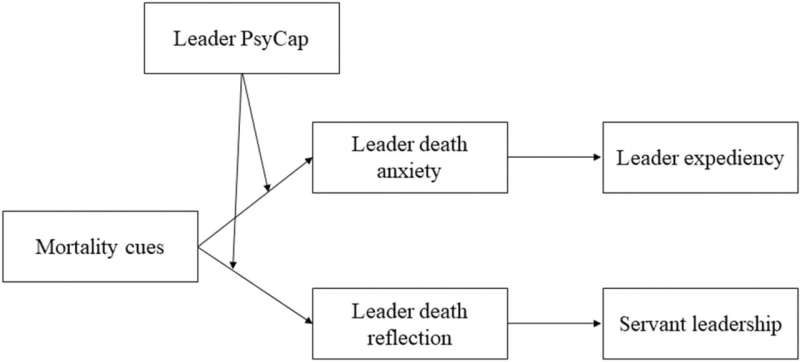How leaders respond when confronted with mortality
Recent research has found that when confronted with the idea of death during the COVID-19 pandemic, some leaders chose to take shortcuts for personal gain, while others stepped up with a selfless and caring attitude.
The key to the difference lay in what experts call “Psychological Capital,” a sort of mental strength encompassing hope, self-efficacy, resilience and optimism, which helped leaders stay cool and make thoughtful decisions in challenging times.
Stan Perron Chair in Business Ethics at The University of Western Australia Business School, Professor Mayowa Babalola, co-lead author of the paper published in the Journal of Management Studies, said the research revealed leaders exhibited contrasting responses when confronted with mortality.
“On one side, we found that some leaders resorted to expedient behaviors, characterized by using unethical practices to achieve personal goals swiftly, including things like cutting corners or making decisions that prioritize self-interest, ” Professor Babalola said.
“On the other side, there was a positive response, where leaders became more reflective and thoughtful and engaged in behaviors that prioritized the well-being of others.”
The multinational study, which spanned the U.K., Pakistan and China, identified death anxiety and death reflection as key distinct psychological mechanisms that explained why mortality cues influenced unethical versus servant leadership behaviors and highlighted the concept of Psychological Capital (PsyCap) as a critical factor shaping how leaders respond to mortality cues.
“By looking at how leaders responded when confronted with reminders of mortality, especially in the context of the challenges posed by the COVID-19 pandemic, we were able to understand the consequences on leadership outcomes,” Professor Babalola said.
“The findings hold significant practical implications for organizations seeking to enhance leadership behaviors during times when mortality is at the forefront of people’s minds, such as in the aftermath of losing loved ones, friends, colleagues, accidents or life-threatening illnesses.
“They also suggested the need for policy-makers and organizations to rethink the types and duration of leaves provided to both leaders and employees as a result of the loss of their loved ones or when exposed to death-related events.”
The study advocates for open workplace conversations about death, acknowledging its impact on both personal and professional lives, and found that by incorporating elements of death reflection into leadership development programs, organizations could foster more thoughtful and altruistic leadership.
More information:
Chidiebere Ogbonnaya et al, Being Aware of Death: How and when Mortality Cues Incite Leader Expediency Versus Servant Leadership Behaviour, Journal of Management Studies (2024). DOI: 10.1111/joms.13051
Citation:
How leaders respond when confronted with mortality (2024, January 29)
retrieved 29 January 2024
from https://phys.org/news/2024-01-leaders-mortality.html
This document is subject to copyright. Apart from any fair dealing for the purpose of private study or research, no
part may be reproduced without the written permission. The content is provided for information purposes only.

Recent research has found that when confronted with the idea of death during the COVID-19 pandemic, some leaders chose to take shortcuts for personal gain, while others stepped up with a selfless and caring attitude.
The key to the difference lay in what experts call “Psychological Capital,” a sort of mental strength encompassing hope, self-efficacy, resilience and optimism, which helped leaders stay cool and make thoughtful decisions in challenging times.
Stan Perron Chair in Business Ethics at The University of Western Australia Business School, Professor Mayowa Babalola, co-lead author of the paper published in the Journal of Management Studies, said the research revealed leaders exhibited contrasting responses when confronted with mortality.
“On one side, we found that some leaders resorted to expedient behaviors, characterized by using unethical practices to achieve personal goals swiftly, including things like cutting corners or making decisions that prioritize self-interest, ” Professor Babalola said.
“On the other side, there was a positive response, where leaders became more reflective and thoughtful and engaged in behaviors that prioritized the well-being of others.”
The multinational study, which spanned the U.K., Pakistan and China, identified death anxiety and death reflection as key distinct psychological mechanisms that explained why mortality cues influenced unethical versus servant leadership behaviors and highlighted the concept of Psychological Capital (PsyCap) as a critical factor shaping how leaders respond to mortality cues.
“By looking at how leaders responded when confronted with reminders of mortality, especially in the context of the challenges posed by the COVID-19 pandemic, we were able to understand the consequences on leadership outcomes,” Professor Babalola said.
“The findings hold significant practical implications for organizations seeking to enhance leadership behaviors during times when mortality is at the forefront of people’s minds, such as in the aftermath of losing loved ones, friends, colleagues, accidents or life-threatening illnesses.
“They also suggested the need for policy-makers and organizations to rethink the types and duration of leaves provided to both leaders and employees as a result of the loss of their loved ones or when exposed to death-related events.”
The study advocates for open workplace conversations about death, acknowledging its impact on both personal and professional lives, and found that by incorporating elements of death reflection into leadership development programs, organizations could foster more thoughtful and altruistic leadership.
More information:
Chidiebere Ogbonnaya et al, Being Aware of Death: How and when Mortality Cues Incite Leader Expediency Versus Servant Leadership Behaviour, Journal of Management Studies (2024). DOI: 10.1111/joms.13051
Citation:
How leaders respond when confronted with mortality (2024, January 29)
retrieved 29 January 2024
from https://phys.org/news/2024-01-leaders-mortality.html
This document is subject to copyright. Apart from any fair dealing for the purpose of private study or research, no
part may be reproduced without the written permission. The content is provided for information purposes only.
